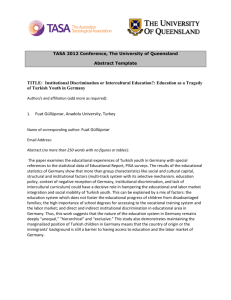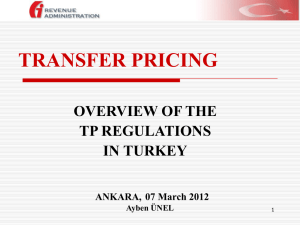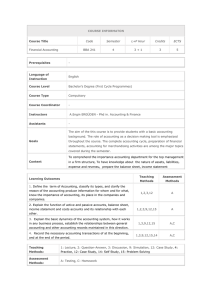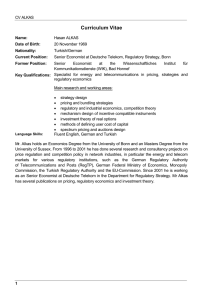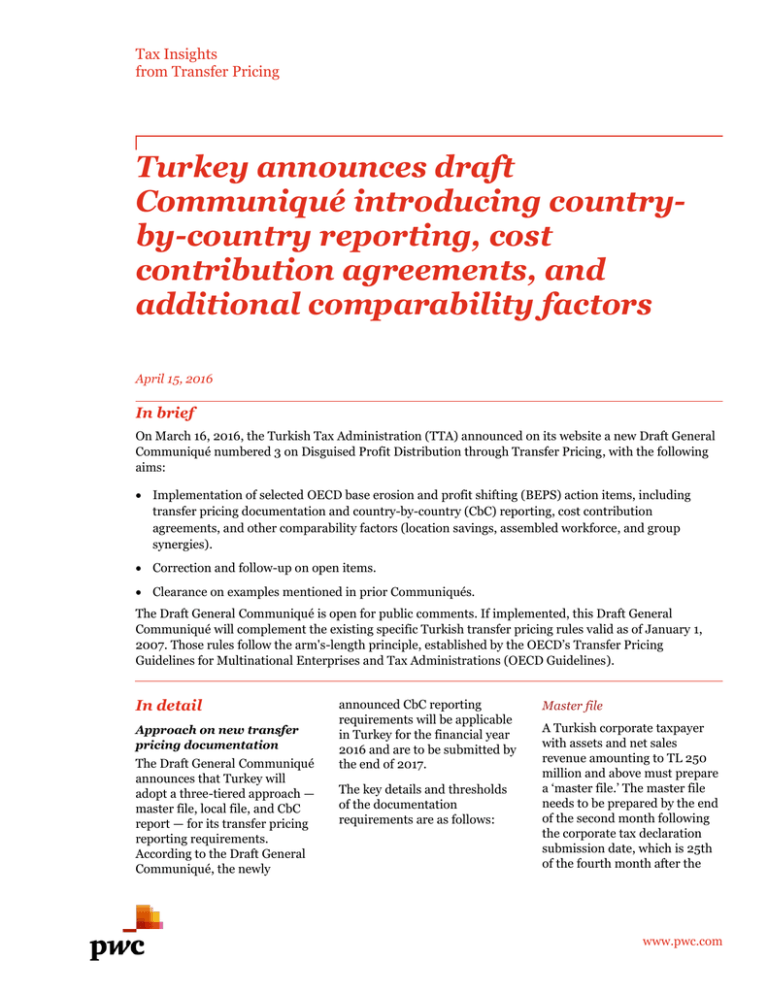
Tax Insights
from Transfer Pricing
Turkey announces draft
Communiqué introducing countryby-country reporting, cost
contribution agreements, and
additional comparability factors
April 15, 2016
In brief
On March 16, 2016, the Turkish Tax Administration (TTA) announced on its website a new Draft General
Communiqué numbered 3 on Disguised Profit Distribution through Transfer Pricing, with the following
aims:
Implementation of selected OECD base erosion and profit shifting (BEPS) action items, including
transfer pricing documentation and country-by-country (CbC) reporting, cost contribution
agreements, and other comparability factors (location savings, assembled workforce, and group
synergies).
Correction and follow-up on open items.
Clearance on examples mentioned in prior Communiqués.
The Draft General Communiqué is open for public comments. If implemented, this Draft General
Communiqué will complement the existing specific Turkish transfer pricing rules valid as of January 1,
2007. Those rules follow the arm's-length principle, established by the OECD’s Transfer Pricing
Guidelines for Multinational Enterprises and Tax Administrations (OECD Guidelines).
In detail
Approach on new transfer
pricing documentation
The Draft General Communiqué
announces that Turkey will
adopt a three-tiered approach —
master file, local file, and CbC
report — for its transfer pricing
reporting requirements.
According to the Draft General
Communiqué, the newly
announced CbC reporting
requirements will be applicable
in Turkey for the financial year
2016 and are to be submitted by
the end of 2017.
The key details and thresholds
of the documentation
requirements are as follows:
Master file
A Turkish corporate taxpayer
with assets and net sales
revenue amounting to TL 250
million and above must prepare
a ‘master file.’ The master file
needs to be prepared by the end
of the second month following
the corporate tax declaration
submission date, which is 25th
of the fourth month after the
www.pwc.com
Tax Insights
close of the financial year. It must be
provided to the TTA in case of a
request or tax inspection by the
authorised inspectors.
The master file should include the
organisational structure of the
multinational group, as well as a
description of the business activities,
intangibles owned, intercompany
financial transactions, and the
financial and tax position of the
group.
Effect on Turkish taxpayers: This
requirement will be particularly
burdensome for Turkish corporate
taxpayers whose parent is outside the
OECD jurisdiction or in a jurisdiction
where the master file requirements
are not yet implemented into national
tax law. Additionally, the threshold of
TL 250 million may obligate a large
number of multinational enterprise
(MNE) group companies resident in
Turkey to disclose the master file to
the TTA.
Local file
The local file covers the preparation of
three sets of documents:
1. Annual transfer pricing report
Corporate taxpayers already are
obliged to prepare an annual transfer
pricing report in line with the format
that is stated in the General
Communiqué No. 1. The report must
be prepared until the filing date of the
corporate tax declaration and shall
compose different levels of
information. The level of information
depends on whether the taxpayers are
registered to the Major Taxpayers Tax
Office or whether the taxpayers
operate in free trade zones (FTZ) in
Turkey.
Major Taxpayers Tax Office
registered taxpayers shall prepare a
local report that comprises
information about both their
2
domestic and cross-border relatedparty transactions.
Other taxpayers shall prepare a
local report that comprises
information about their crossborder related-party transactions.
With the change in this new Draft
Communiqué, the corporate
taxpayers operating in the FTZ in
Turkey shall prepare a local report
that comprises information about
their transactions with their
related parties in Turkey and
abroad.
2. Transfer pricing form
This form already is a requirement for
all companies having international
related-party as well as domestic
related-party transactions. It is a onepage form disclosing:
related-party transactions of the
entity, and
the amounts and methods used for
intercompany transactions,
and is an attachment to the corporate
tax declaration. The draft General
Communiqué introduces a threshold
of TL 30,000. In case the total
transaction volume does not exceed
TL 30,000, the form is not
mandatory. Furthermore, any
transaction that does not exceed TL
30,000 is not to be included in the
transfer pricing form.
3. New transaction-based transfer
pricing form
This is a new requirement introduced
for certain Turkish taxpayers. In order
to facilitate desktop reviews, a new
electronic form is introduced for
Turkish taxpayers with assets and net
sales revenues exceeding TL 100
million. The form must be submitted
by the end of the second month
following the filing date of the
corporate tax returns.
The form requires providing:
general information about the
related party
the NACE code of the entity
according to each segmented
business unit commercial activity
total purchases and sales
transactions performed with each
related party
whether there are reported
activities in the FTZs in Turkey
(yes/no) and if yes the details of
the entities/branches in the FTZs
whether there are tax inspection
reports written for the entity or
related parties of the entity
(yes/no) and if yes the tax number,
name, country, and period of the
entities having an inspection report
whether there are contract
manufacturing agreements and
cost contribution agreements
(yes/no), and
whether there are withholding tax
and reverse charge VAT calculated
over the intercompany transactions
with related parties and details of
those.
In addition, a separate form must be
prepared for transactions with each
related party when exceeding TL
30,000. The more detailed separate
form discloses the following
information:
The tax number, company name,
address, and country of residence
of the related party, together with
the country code
Whether the related party controls
the Turkish entity, the Turkish
pwc
Tax Insights
entity controls the related party, or
other
If Turkish entity controls the
related party, the shareholding
ratio
Related party’s NACE, SIC, or
other commercial activity code
Detailed amounts, the percentage
of those transactions among total
transactions with this related
party, and the transfer pricing
methods for each transaction
performed with this related party
Details of financial transactions
with the related party
Details of derivative products with
the related party
Details of royalty transactions with
the related party
Details of loans, advance
payments/receipts, investments,
and other
Details of current accounts with
the related party.
Effect on Turkish taxpayers: With the
new form, detailed information is
required from Turkish taxpayers.
Therefore, when these requirements
apply for Turkish companies the
compliance burden will be significant.
Turkish companies will have to
3
disclose the required transfer pricing
forms starting from the financial year
2016 onwards. Since the information
requirements are extremely detailed,
additional resources and of course
time may be needed.
CbC report
The Turkish resident parent company
of an MNE group whose consolidated
group revenue amounts to TL 2.037
million and above (for 2017 and
following fiscal years, Turkish Lira
equivalent of EUR 750 million by
using the January average of the
foreign exchange buying rate
announced by the Central Bank of the
Republic of Turkey for the previous
year) shall prepare the CbC report to
be submitted electronically by the end
of the 12th month following the fiscal
year of the resident parent company.
The CBC report is applicable for the
financial year 2016.
The CbC report may not need to be
filed by the Turkish subsidiary of a
multinational group provided that (1)
the group’s parent entity is in a
jurisdiction with which Turkey has an
information sharing agreement for
CbC reporting in place and (2) CbC
reporting rules have been enforced in
the parent headquarter’s country
(covering the relevant year) . In cases
where no CbC rules have been
enforced in the country of the parent’s
headquarter, the Turkish subsidiary
will have to provide the CbC report as
representative.
The content of the CbC report
includes the following information:
Table 1: The countries where the
MNE group operates, revenues,
profit/loss before tax,
income/corporate taxes paid,
accrued income/corporate taxes,
nominal capital, previous years’
profits (accumulated earnings),
number of employees, and tangible
fixed assets other than cash and
cash equivalents.
Table 2: The name/title, place of
incorporation (if the place of
operation is different than the
place of incorporation, the place of
operation as well) and nature of
core business activities regarding
each enterprise of the MNE group.
The CbC report will be mutually
shared with the tax authorities of
other countries in the framework of
bilateral and/or multilateral
international agreements to which
Turkey is a party. The list of the
countries party to such agreements
shall be published by the TTA.
The deadlines for the reporting
requirements and responsibilities are
summarised as follows:
pwc
Tax Insights
Deadlines of reporting requirements and responsibilities
What
Who
When
Master file
A Turkish corporate taxpayer that is a member
of an MNE group with assets and net sales
revenue amounting to TL 250 million and above.
To be prepared by the end of the second month following
the filing date of the corporate tax return (25th of the fourth
month following the end of the fiscal year).
To be submitted within 15 days upon request.
Local file: Annual
transfer pricing
report
Turkish resident taxpayer.
To be prepared by the filing date of the corporate tax
returns (25th of the fourth month following the end of the
fiscal year).
Local file:
Transfer pricing
form Appendix 2
Turkish resident taxpayer with intercompany
transactions exceeding TL 30,000.
To be submitted electronically as an attachment to the
corporate tax returns (25th of the fourth month following
the end of the fiscal year).
Local file:
Transfer pricing
form Appendix 4
Turkish resident taxpayer with assets and net
sales revenues exceeding TL 100 million.
To be submitted electronically by the end of the second
month following the filing date of the corporate tax returns.
CbC report
Turkish resident parent company of an MNE
group whose consolidated group revenue
amounts to TL 2.037 million and above.
To be submitted electronically by the end of the 12th month
following the fiscal year of the parent headquarter.
To be submitted within 15 days upon request.
Other important changes
In addition to the specific transfer
pricing reporting requirements,
additional requirements or rules
covering transfer pricing regulations
and changes to the past Communiqués
number 1 and 2 are included in the
Draft General Communiqué Number
3. Some further important changes in
the Draft General Communiqué are as
follows:
New comparability factors
Turkish transfer pricing legislation
includes a list of comparability
factors: the nature of products or
services compared, functions, risks
and assets used, conditions of
contracts, economic conditions, and
business strategies. With the
implementation of the new Draft
General Communiqué, new
comparability factors which also are
announced by the BEPS action plan
are introduced into Turkish
legislation: location savings,
assembled workforce, and MNE group
synergies. The Draft General
Communiqué also introduces
examples regarding the determination
4
and consideration of the factors in a
comparability analysis.
covering the type of taxes concerned
and the period to be considered.
These changes aim to further
underline the need to find local
comparables despite their availability
in public domain. The draft stressed
the need to make further
comparability adjustments
considering these three parameters
when local comparables are not used.
The takeaway
Cost contribution arrangements
Cost contribution agreements have
not been a part of Turkish transfer
pricing legislation. For the first time,
definition and guidance are
introduced. The related paragraphs
generally are translations of certain
paragraphs of the recent OECD report
on cost contribution agreements.
Treasury loss
Treasury loss was introduced
previously to provide a shelter for
domestic transactions on conditions
that Turkish Treasury is not losing any
taxes due to a non-arm’s length
pricing. The draft introduces further
explanations and clarification
As TTA is open to receiving
recommendations from stakeholders
for the Draft General Communiqué,
Turkish MNEs and other corporate
taxpayers should provide their public
comments on the new legislative
requirements.
The new Draft General Communiqué
broadens and to some extent corrects
important parts of the existing
legislation. The new detailed transfer
pricing forms are important
requirements which will cause high
administrative burden and workload
to Turkish taxpayers which are
obliged to prepare those forms.
Cost contribution arrangements are
another substantial topic that has
been introduced for the first time
under Turkish legislation. From the
wording of the Draft General
Communiqué, we understand that
these arrangements are mostly useful
for the development of certain
pwc
Tax Insights
intangibles within Turkish
multinationals.
Although the new rules on
comparability factors may still need a
more systematic approach, they are
expected to be effective measures for
comparison and may have an effect on
using foreign comparables.
The underlying theme of the new draft
Communiqué is the new
documentation requirements of BEPS
Action Item 13, which are now
introduced in Turkey, as well as the
additional requirements on the local
filings with significant additional
disclosures by Turkish resident
taxpayers. In particular, the parent
companies of MNEs in Turkey will
need to gather and maintain a
comprehensive amount of information
to fulfill the disclosure requirements
at the local and global level. They will
need to determine efficient ways of
communication and collaboration
with related parties (cross-border and
domestic) to be ready to respond on
time to the requests of TTA and other
tax authorities in different
geographies. The TTA, on the other
hand, will soon have access to this
data and will use them for risk
assessment purposes and the finetuning of their inspection strategies.
In view of these new reporting
requirements and other mentioned
legislative changes, Turkish MNEs
and other taxpayers should commence
preparation to collect and analyse the
necessary information in accordance
with the requirements.
Let’s talk
For a deeper discussion of how this issue might affect your business, please contact:
Transfer Pricing
Özlem Güç Alioğlu, Istanbul
Turkey Transfer Pricing Leader
+90 (212) 326 6462
ozlem.guc@tr.pwc.com
Canan Aladağ, Istanbul
+90 (212) 326 6458
canan.aladag@tr.pwc.com
Devrim Aşkın, Istanbul
+90 (212) 326 6662
devrim.askin@tr.pwc.com
Ramazan Biçer, Istanbul
+90 (212) 326 6675
ramazan.bicer@tr.pwc.com
Can Nizamoğlu, Istanbul
+90 (212) 326 6786
can.nizamoglu@tr.pwc.com
Transfer Pricing Global and US Leaders
Isabel Verlinden, Brussels
Global Transfer Pricing Leader
+32 2 710 44 22
isabel.verlinden@be.pwc.com
Horacio Peña, New York
US Transfer Pricing Leader
+1 646 471 1957
horacio.pena@pwc.com
Stay current and connected. Our timely news insights, periodicals, thought leadership, and webcasts help you
anticipate and adapt in today's evolving business environment. Subscribe or manage your subscriptions at:
pwc.com/us/subscriptions
SOLICITATION
© 2016 PwC. All rights reserved. PwC refers to the PwC network and/or one or more of its member firms, each of which is a separate legal entity.
Please see www.pwc.com/structure for further details.
This content is for general information purposes only, and should not be used as a substitute for consultation with professional advisors.
PwC helps organisations and individuals create the value they’re looking for. We’re a network of firms in 157 countries with more than 195,000 people
who are committed to delivering quality in assurance, tax and advisory services. Find out more and tell us what matters to you by visiting us at
www.pwc.com
5
pwc


